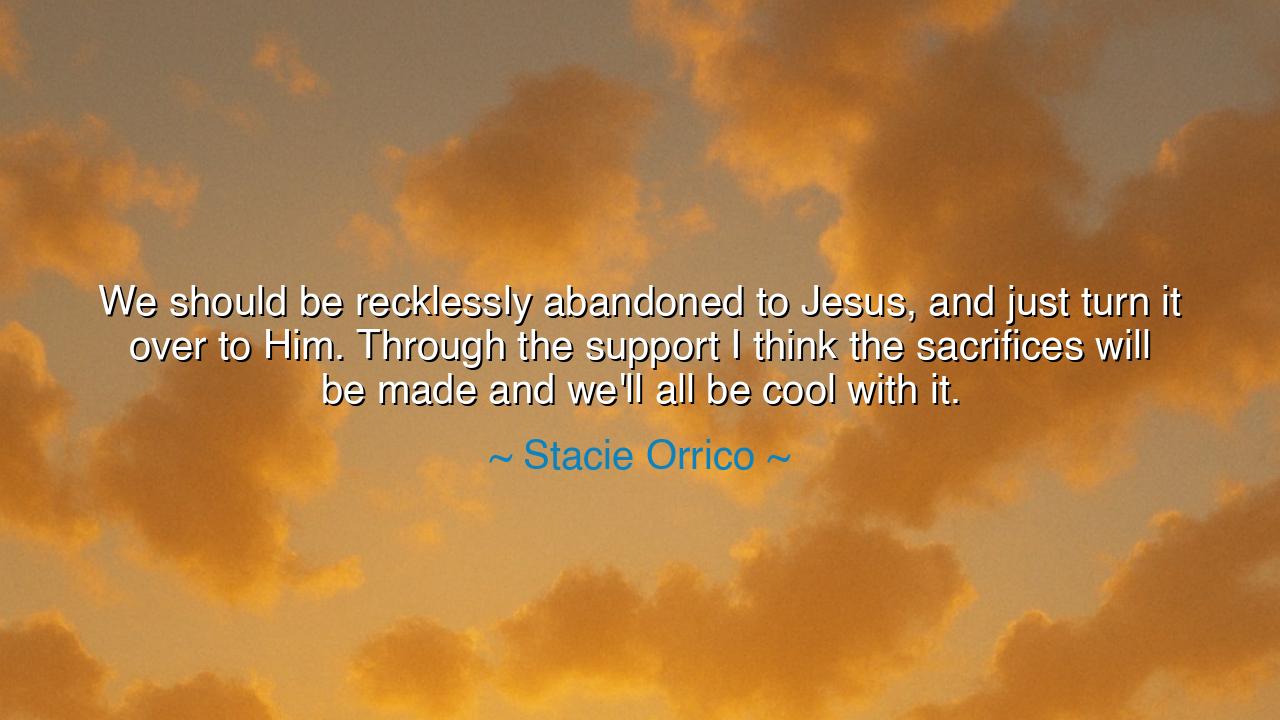
We should be recklessly abandoned to Jesus, and just turn it over
We should be recklessly abandoned to Jesus, and just turn it over to Him. Through the support I think the sacrifices will be made and we'll all be cool with it.






**In the deep waters of ancient wisdom, there is a recurring theme—surrendering to a higher power, a force that is beyond human understanding and control. The ancients knew that true peace and purpose are not found in the struggle for control but in the reckless abandonment to something greater than oneself. Stacie Orrico’s words—“We should be recklessly abandoned to Jesus, and just turn it over to Him. Through the support I think the sacrifices will be made and we'll all be cool with it”—reflect this timeless truth. Reckless abandonment is not about foolishness; it is about a deep trust and a willingness to let go of our own desire for control and to surrender to a force that can guide us toward a higher purpose.
To be recklessly abandoned to Jesus, as Orrico suggests, is a call to let go of the weight of the world and place our trust in something greater. The ancients often spoke of faith—not a passive belief, but an active, reckless surrender to the divine. In the same way that Homer’s Achilles was driven by a sense of fate, not just glory, the great heroes of the ancient world often had to make the choice to surrender to the greater forces at work. For them, fate was not something to be resisted, but something to be embraced. Orrico's words mirror this understanding: when we choose to trust and surrender, we are taken care of, and the sacrifices that come with this journey are made not with fear, but with a sense of peace and purpose.
Consider the story of Abraham, the ancient patriarch who, when called by God, left everything behind without question. He abandoned his home, his wealth, and his identity to follow what he believed to be the will of God. This was a reckless abandonment in the eyes of many, but for Abraham, it was a faithful surrender, an act of obedience that would lead to the blessing of nations. Through his sacrifice and trust in God, Abraham became the father of faith. Just as Abraham trusted in a higher purpose, so too does Orrico’s quote call for reckless abandonment to something greater than our own understanding—trusting that the sacrifices we make will be honored, and that peace will follow.
The ancient philosophers, such as Socrates and Plato, spoke of a higher truth, something that transcended the physical world. For them, true wisdom was not found in knowledge alone, but in the relinquishment of ego and surrender to the truth. Socrates, in his willingness to accept his fate, demonstrated this very principle when he chose to drink the poison rather than flee. His surrender to the inevitable was not an act of defeat, but an affirmation of his faith in the higher order of the universe. Orrico’s call to abandon ourselves to Jesus echoes this same sense of trust in a divine plan—a recognition that by letting go of our need for control, we can find a deeper peace and a higher sense of purpose.
In modern times, we see similar acts of surrender in the lives of those who dedicate themselves to service, who trust that their efforts will be guided by a higher power. Take, for example, the life of Mother Teresa, who, in her selfless devotion to the poor and sick, embodied the very idea of reckless abandonment. She did not cling to material wealth or personal success, but surrendered herself completely to the service of others, trusting that her sacrifices would not only help those in need but would fulfill her higher purpose. Her example demonstrates how faith and surrender lead to a deeper fulfillment, where the struggles and sacrifices of life are transformed into acts of compassion and grace.
The lesson here is clear: to live with reckless abandonment is not about irresponsibility, but about a deep, trusting faith in the divine plan. By letting go of our constant striving for control and embracing a life of faith and surrender, we find that the sacrifices we make are not burdens, but steps toward a greater purpose. Orrico’s message calls us to trust in the higher power that guides us, knowing that in surrendering, we are not losing ourselves, but gaining something greater than we could ever achieve on our own.
In your own life, consider where you might be holding on too tightly, where the need for control is keeping you from experiencing the peace and fulfillment that comes with surrender. Recklessly abandon yourself to the higher purpose—whether in faith, service, or personal growth—and trust that the sacrifices you make will lead to a life of meaning, peace, and purpose. Just as Abraham, Socrates, and Mother Teresa embraced surrender as a path to higher truth, so too can you find your own way to live with faith and trust in the divine guidance that leads you forward.






AAdministratorAdministrator
Welcome, honored guests. Please leave a comment, we will respond soon